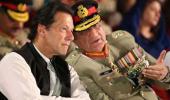Pakistan's media on Sunday welcomed the regime change in Islamabad, while expressing relief that a 'catastrophic collision' between the pillars of the state has been averted as the minority government led by Imran Khan tried to cling on to power.

Khan was ousted from power after losing a no-confidence vote in his leadership following days of high drama.
The vote was held past midnight after Khan's minority government tried its best to stall the no-trust motion tabled by the Opposition parties against the cricketer-turned-politician.
'At one point late last night, it seemed as if all the pillars of the state were on course for a catastrophic collision. Calamity seemed ready to strike at the highest levels of the state,' the Dawn newspaper said in an editorial.
'Even with his ouster a near certainty, Mr Imran Khan seemed more than willing to turn a simple parliamentary procedure into a farce by forcing the heads of the judiciary and military, along with the entire legislature, to play along to the 'last ball' of his tiresome ruse,' it commented in an editorial titled 'Back to the pavilion.'
It also pointed out that the government of Khan became increasingly reliant on the establishment (the powerful military) for 'guidance' in key decision-making areas.
'This ultimately proved fatal for it when the establishment decided they would no longer be providing any crutches for the government to stand on,' the editorial said.
Pakistan's powerful Army, which has ruled the coup-prone country for more than half of its 75 years of existence, has hitherto wielded considerable power on matters of security and foreign policy.
In its editorial, The News International pointed out that it could have all gone so differently.
'That it took a Supreme Court intervention, and then a chaotic day which saw the Supreme Court and Islamabad High Court again opening their doors late at night is an unfortunately accurate reflection of the way the Pakistan Tehreek-e-Insaf (PTI) has run its regime: with scant regard for any procedure or respect for institutional dignity,' it said as Khan repeatedly claimed that he was a victim of a 'foreign conspiracy' hatched in the US aimed at a regime change in Pakistan.
The editorial said that Khan could have attended the National Assembly session on Saturday morning when it was convened; the speaker could have followed the Supreme Court's directives and held the count for the vote of no-confidence; and the ruling party and its Prime Minister 'could have managed some semblance of dignity on their way out'.
'But, in keeping with the past nearly four years in government, the PTI and Imran Khan decided to delay the National Assembly session as much as they could via adjournments and not allowing the vote of no-confidence to go ahead,' the newspaper commented.
Pakistan has been used to dictators making last-ditch efforts when they see power slipping away and when their rule is about to end.
Politicians know that they do not have a shelf-life so they live to fight another day and wait for the power of the ballot to speak for them.
'But to see a civilian leader resort to these tactics, subverting the Constitution and not allowing a vote of no-confidence to take place was simply mind-boggling and disappointing after such a long struggle for continuous democratic transitions in the country,' the editorial tiled 'Imran voted out' said, criticising Khan's actions.
The Express Tribune, in its editorial pointed out that despite constant reminders from the Opposition during the daylong proceeding, the no-confidence resolution against Khan was not put to the vote.
'The sporadic speeches that followed from both sides were in negation of what they were there for the day,' it said in its editorial titled 'Defiance in distaste.'
The unbecoming delaying tactics on the part of the government were tantamount to not only contempt of court but also politically in a bad taste at the cost of brewing anarchy, it concluded.











 © 2025
© 2025